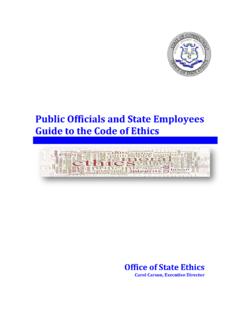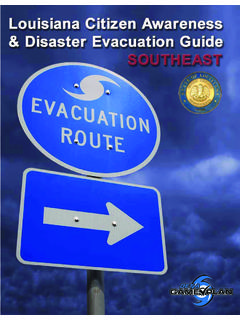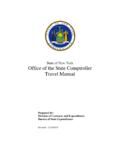Transcription of State of Wisconsin Procurement Desk Guide
1 1 State of Wisconsin Procurement desk Guide State Bureau of Procurement Division of Enterprise Operations September 2016 1 State of Wisconsin Procurement desk Guide Contents Page Foreword 1 Laws and Concepts 2 Procurement Organization and Delegation 3 Contracts 6 Methods and Procedures 7 Special Statutory Considerations 12 Resources 15 Parting Advice 16 Index and Links to Internet Resources 17 Foreword This desk Guide introduces the reader to State of Wisconsin Procurement policies and While this booklet gives meaning to major terms and concepts, it is by no means comprehensive and should not be relied upon as a substitute for the laws, codes and policies that govern State purchasing. State Procurement is the method by which agencies (including University of Wisconsin campuses) purchase goods and services. In general, Procurement rules apply to any purchase paid from agency or campus accounts, regardless of the source of funding.
2 Most large organizations public and private regard Procurement as a critical element in the effective acquisition of products and services needed to serve customers. Procurement creates savings and improves efficiency by identifying the right process, product, price, quantity, quality, and time and place of delivery. _____ 1 This Guide does not apply to State building construction, highway construction, municipal or quasi-public Procurement activities. 2 Wisconsin Procurement laws are longstanding and based upon nationally-accepted best practices. State employees are required to follow Procurement rules for several reasons: Provide vigilant stewardship of taxpayer funds Comply with Wisconsin Statutes and Administrative Codes Inspire public confidence in State government by following consistent and transparent processes Ensure the vendor community has access to open and fair competition for State contracts Avoid individual liability for illegal purchasing Laws and Concepts State Procurement Laws.
3 Wisconsin Procurement statutes provide a framework for the policies and procedures used by State agencies and campuses to acquire goods and services needed for day-to-day operations. State Procurement laws and policies are established as follows: , Wis. Stats., apply to all general purchasing of goods and services by agencies and campuses ADM 5-11 and 50, Wisconsin Administrative Code, define purchasing and competitive bidding policies The State Procurement Manual sets forth detailed Procurement policies and procedures Procurement Concepts. Four major concepts provide the foundation for State Procurement activities: competition, consistency, integrity and openness. Competition. With limited exceptions, State law provides that agencies will award contracts to the lowest responsible bidder or highest scoring proposer. Competition brings about lower prices and higher quality goods and services.
4 To create a competitive environment, agencies must develop solicitations with clear specifications that encourage bidding by multiple vendors. 3 Consistency. State Procurement laws, policies and procedures apply equally to all agencies, campuses and vendors. Consequently, the State strives to use consistent processes across State government. Agencies must provide fair treatment of all vendors. To that end, bids and proposals are compared and evaluated on an equal basis. The specifications presented in a solicitation must relate to the deliverables provided in any resulting contract. Consistency helps agencies conduct transparent and defensible procurements as expected by the public and vendor community. Integrity. Procurement is not a mechanized process, but rather one carried forward by the actions and decisions of people. As such, Procurement officials and evaluators must understand and fulfill their responsibilities at each stage of a Procurement process.
5 All decisions and activities must be measured against a standard of fairness that will withstand public and legal scrutiny. Openness. Unclear or ambiguous communications with vendors and stakeholders can compromise even the best procurements. To avoid misperceptions, solicitations, notifications and award decisions must be written in clear, understandable language. In addition, all records relating to a Procurement activity are open to public inspection and should be maintained in a central location. Procurement Organization and Delegation State Bureau of Procurement . , Wis. Stats., provides that the Department of Administration (DOA) shall purchase and may delegate to special designated agents the authority to purchase all necessary materials, supplies, equipment, all other permanent personal property and miscellaneous capital, and contractual services and all other expense of a consumable nature for all agencies.
6 DOA implements this law through the State Bureau of Procurement (SBOP). The SBOP Director serves as the State Procurement Director. 4 SBOP administers Procurement laws, policies and procedures on behalf of all agencies and campuses. SBOP s responsibilities include: Interpret statutes and administrative code Establish policies and procedures governing all agency and campus procurements Manage statewide procurements and contracts for goods and services used across State government Provide training and consulting services to agencies Maintain VendorNet, the State s online purchasing information system Perform management reviews of agencies and campuses for compliance with State Procurement laws, policies and procedures Delegation and Delegated Agencies. DOA, through SBOP, delegates Procurement authority to the nine agencies that represent the highest levels of general purchasing in State government: Department of Administration Department of Children and Families Department of Corrections Department of Health Services Department of Justice Department of Natural Resources Department of Transportation Department of Workforce Development University of Wisconsin System Administration (UWSA in turn delegates Procurement authority to campuses) University of Wisconsin - Madison Each delegated agency employs a specially designated purchasing agent and staff to implement Procurement laws and conduct agency-specific solicitations.
7 In addition, the delegated agencies are represented on the Interagency Procurement Council (IPC), a workgroup consisting of Procurement officials from the delegated agencies that examines and reviews purchasing trends, policies, and best practices. 5 Non Delegated Agencies. Most non-delegated executive agencies receive Procurement management services directly from the Consolidated Agency Purchasing Services (CAPS) section in the State Bureau of Procurement . CAPS conducts procurements over $50,000 for its supported agencies, and each agency has a designated purchasing liaison to CAPS. CAPS-supported agencies include: Department of Agriculture, Trade and Consumer Protection Department of Financial Institutions Department of Military Affairs Department of Public Instruction Department of Revenue Department of Safety and Professional Services Department of Tourism Department of Veterans Affairs Office of the Commissioner of Insurance Office of the Governor Office of the Lt.
8 Governor Office of the Secretary of State Office of the State Public Defender Office of the State Treasurer Board on Aging and Long Term Care Educational Communications Board Board for People with Developmental Disabilities Wisconsin National and Community Service Board District Attorneys Program Judicial Council Labor and Industry Review Commission Kickapoo Valley Reserve Tax Appeals Commission Wisconsin Arts Board Wisconsin Women s Council 6 Contracts Statewide Contracts. SBOP manages contracts for products and services commonly purchased across State government agencies and campuses. Statewide contracts offer several benefits including: Lower pricing Standard terms and conditions Consistent warranties and customer service requirements Most statewide contracts are mandatory. However, agencies may in limited instances request waivers from mandatory contracts to meet specialized needs.
9 Examples of statewide contracts include paper, furniture, flags, janitorial supplies, financial services, vehicles and related supplies, information technology services, personal computers and software, office supplies and machines, e lectrical and plumbing supplies (maintenance, repair and operations), pharmaceuticals, and hazardous waste Agency Contracts. Statewide contracts meet some, but not all, of State government s needs. Scores of agency contracts exist with specifications tailored to meet the exact and unique requirements of an agency s mission or programs. Delegated agency Procurement personnel manage internal solicitations that result in agency contracts; CAPS manages agency procurements on behalf of non-delegated agencies. Examples of agency contracts include social and medical services, security services and equipment, clothing and uniforms, and specialized information technology solutions.
10 Trained professionals implement competitive bidding procedures for the Procurement of all goods and services over $50,000. A Procurement professional s duties include: _____ 3 Most statewide and agency contracts are available for use by municipalities, including Tribal governments. 7 Maintain knowledge of Procurement laws, codes, policies and procedures Lead official bid processes Ensure solicitations are open and fair, specifications are not restrictive and end user needs are met Verify bid pricing and maintain records Methods and Procedures Methods. Competitive bidding is the preferred method for selecting suppliers of goods and services. However, alternate methods may be considered if competitive bidding is justified as impractical or not in the best interests of the State . State law provides the following Procurement methods: Competitive Solicitation (Request for Bids, Request for Proposals, Simplified Bidding, Best Judgment) Sole Source Waiver Emergency Procurement Waiver of Bidding Process Other Procurement Processes (Piggybacking, Collective, Intergovernmental, Cooperative) Agencies must submit certain Procurement actions to SBOP for approval prior to release of solicitations.





